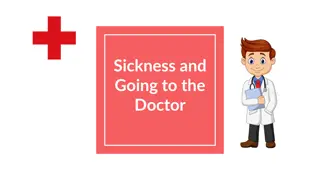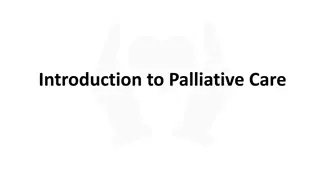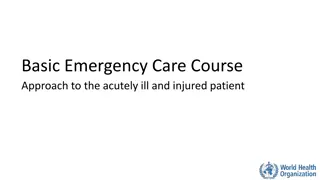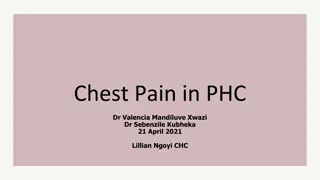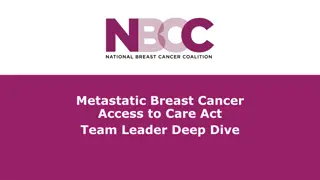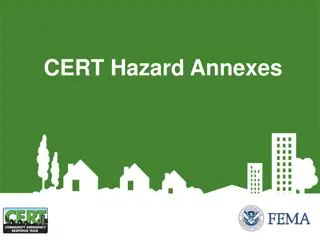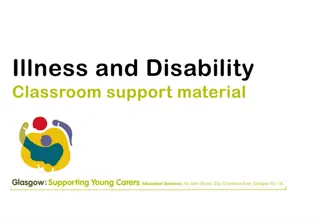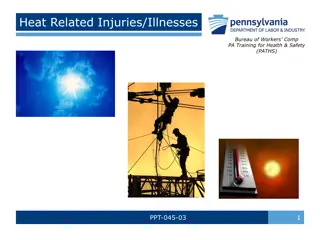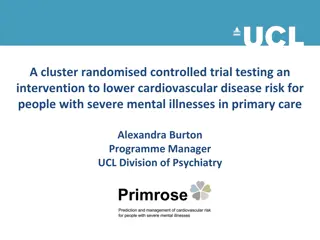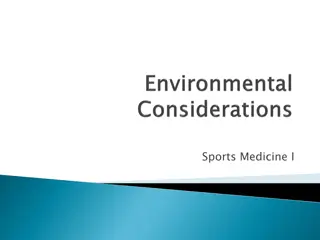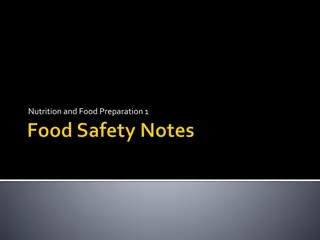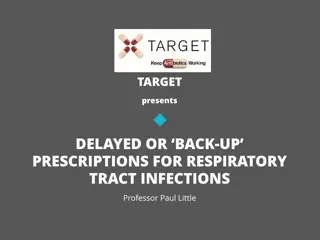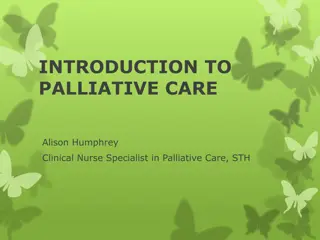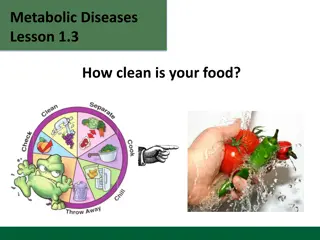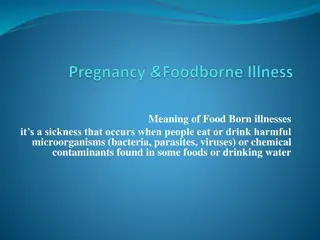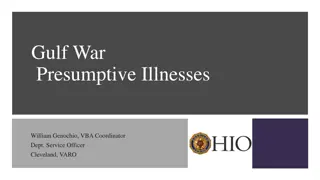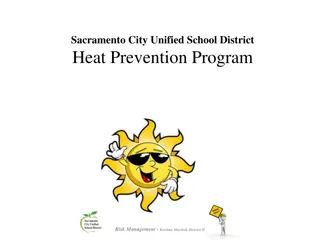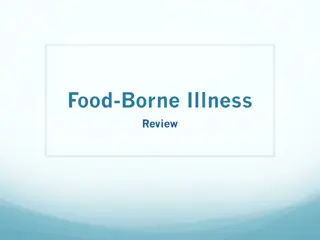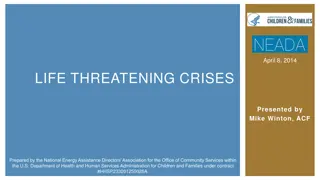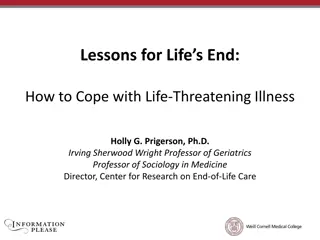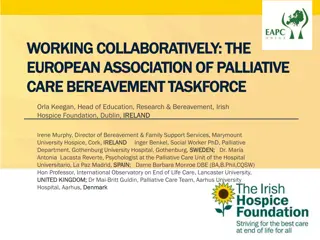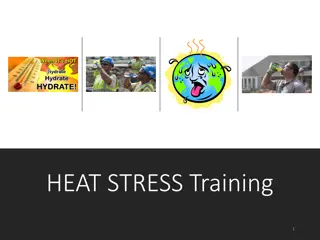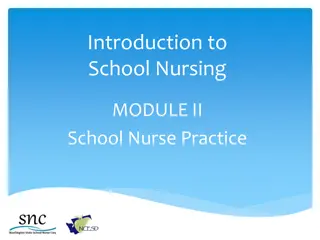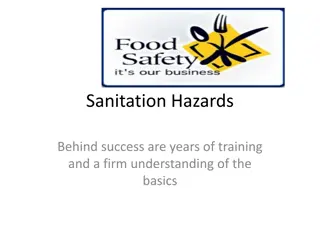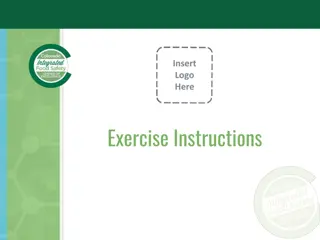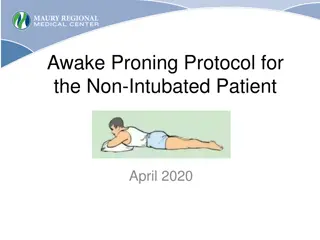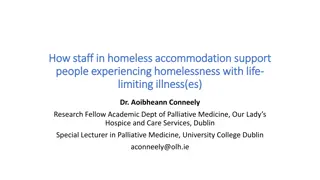Impact of Evidence-based Supported Employment on Health and Social Determinants
Providing evidence-based supported employment can positively impact social determinants of health by addressing economic stability, reducing risk factors for preventable illnesses, and improving access to quality healthcare. Employment plays a crucial role in mental health intervention and can help
3 views • 36 slides
Insights from 2023 Annual Exchange and Training Day: "End of Life or Hunger for Life
The annual exchange and training day in 2023 focused on the theme "End of Life or Hunger for Life." Results from the questionnaires showed responses from healthcare workers, families, and individuals with disabilities. There was discussion about awareness of the Claeys-Leonetti law, perspectives on
4 views • 24 slides
Understanding Common Illnesses and Health Advice
Explore various common illnesses like flu, fever, headache, cold, and their symptoms through images. Learn how to describe illnesses using verbs and match symptoms with the right illness. Additionally, discover health advice using "should" and "shouldn't" with appropriate illnesses.
1 views • 18 slides
Understanding Palliative Care: Enhancing Quality of Life in Serious Illness
Palliative care is a holistic approach focused on improving the quality of life for patients and their families dealing with life-threatening illnesses. It involves early identification, assessment, and treatment of pain and other physical, emotional, and spiritual issues. This comprehensive trainin
0 views • 60 slides
Basic Emergency Care Course Approach for Acutely Ill and Injured Patients
This basic emergency care course provides a systematic initial approach for frontline healthcare providers managing acute life-threatening conditions with limited resources. Participants will learn to assess patients using the ABCDE approach, provide interventions for life-threatening conditions, an
0 views • 9 slides
Understanding Chest Pain Management at Primary Healthcare Level
Chest pain is a common presentation requiring swift identification and management to distinguish life-threatening causes like Myocardial Infarction. This article focuses on the approach to chest pain at a primary healthcare level, detailing cardiac and non-cardiac causes, recognizing urgent cases, a
2 views • 52 slides
Evolution of Access to Healthcare Legislation for Critical Illnesses
Legislation has evolved over the years to improve access to healthcare for individuals with critical illnesses like ALS and metastatic breast cancer. Waiting periods were eliminated to ensure timely coverage, with strategic decisions made to involve key stakeholders in the process, ultimately leadin
0 views • 21 slides
Extreme Heat Preparedness and Impacts: CERT Hazard Annexes
Introduction to CERT Hazard Annexes focusing on extreme heat, discussing heat-related illnesses, impacts of extreme heat, and preparedness measures including insulation, window protection, and attic fans. The content emphasizes the preventable nature of heat-related illnesses and the vulnerabilities
0 views • 26 slides
Understanding Illness and Disability for Young Learners
This learning module aims to develop young learners' understanding of illness and disability by distinguishing between long-term and short-term illnesses, recognizing various medical conditions, and fostering empathy through discussions and activities. Students will engage in tasks such as listing d
0 views • 18 slides
Life-threatening Injuries and Emergency Response: Real-life Cases
Life-threatening incidents such as severe bleeding, blast injuries, and gunshot wounds require swift emergency medical attention. This content showcases real-life cases where expert emergency services and medical interventions saved lives in critical situations. From miraculous dressings to innovati
0 views • 25 slides
Understanding Foodborne Illness: Causes and Symptoms
Foodborne illnesses are diseases transmitted to humans through contaminated food, causing symptoms like nausea, vomiting, stomach cramps, fever, and diarrhea. These illnesses are mainly caused by pathogenic microorganisms such as bacteria, viruses, and parasites, often spread through mishandling of
0 views • 10 slides
Understanding Heat-Related Injuries and Illnesses in the Workplace
Learn about different types of heat injuries/illnesses, prevention tips, statistics, and who is affected by heat-related issues. Discover how heat stress occurs, the body's cooling system, and the dangers of heat stroke. This comprehensive guide will help you understand how to work safely in the sun
3 views • 46 slides
Cluster Randomised Controlled Trial for Cardiovascular Disease Risk in Severe Mental Illness
A cluster randomised controlled trial is being conducted to test an intervention aimed at reducing cardiovascular disease risk for individuals with severe mental illnesses in primary care settings. Led by Professor David Osborn at UCL Division of Psychiatry, the study is funded by the National Insti
0 views • 21 slides
Understanding Severe Mental Illness in Mothers: Impacts and Support
Mothers with severe mental illnesses like Schizophrenia face unique challenges in parenting. Support from partners, family, and the community is crucial for their well-being. Despite the difficulties, with proper treatment and support, women with severe mental illnesses can effectively fulfill their
3 views • 23 slides
Health Education Unit Overview
This educational unit focuses on identifying and using different illnesses, practicing the interrogative form of present continuous tense, and enhancing listening, speaking, and writing abilities. Students will learn about various common illnesses and how to form interrogative sentences in the prese
0 views • 10 slides
Learning About Common Illnesses - Health Lesson for Students
In this lesson, students will learn about common illnesses and how to describe symptoms like runny nose, headache, stomach ache, and chills. They will also understand proper ways to take care of themselves when sick and identify parts of a letter. The lesson includes engaging activities, new vocabul
0 views • 23 slides
Understanding Heat-Related Illnesses in Sports Medicine
Hyperthermia is a condition where body temperature is elevated, posing risks like heat stress and heat-related illnesses. Proper knowledge of factors like temperature, humidity, and hydration is crucial for athletes and coaches to prevent such conditions during workouts. Metabolic heat production, c
1 views • 29 slides
Food Safety and Prevention of Food-borne Illnesses
An estimated 48 million Americans suffer from food-borne illnesses yearly, caused by harmful microorganisms due to poor food handling practices. Factors contributing to food-borne illnesses include improper cooking, inadequate storage, and cross-contamination. To prevent such illnesses, it is essent
0 views • 23 slides
Antibiotics in Primary Care: Balancing Benefits and Risks
Antibiotics play a crucial role in healthcare, but their overuse can lead to medicalization of illnesses and unnecessary prescriptions. Evidence suggests limited symptom relief from antibiotics in certain conditions. Delayed or back-up prescriptions are recommended to reduce unnecessary antibiotic u
0 views • 34 slides
Overview of Palliative Care: History, Definition, and Aims
Explore the rich history and development of palliative care from ancient times to modern practices. Learn about the aims of palliative care, including improving quality of life for patients facing life-threatening illnesses. Discover the holistic approach of palliative care and the importance of sup
0 views • 21 slides
Food Safety and Preventing Food-borne Illness
This lesson focuses on the importance of food safety, addressing how clean our food is and at what points safety can be compromised. It delves into common types of microbes that contaminate foods and explores ways in which food safety can be compromised. The activity involves case studies on food sa
0 views • 11 slides
- Risks of Foodborne Illnesses During Pregnancy
- Pregnant women are at high risk of foodborne illnesses due to weakened immune systems. Such illnesses can lead to serious health issues for both mother and fetus, including miscarriage and premature delivery. Symptoms may include stomach-related discomfort, vomiting, and diarrhea. Immediate medica
0 views • 15 slides
Gulf War Presumptive Illnesses and Eligibility Requirements for Veterans
Gulf War Veterans who served in the Southwest Asia theater of military operations may be entitled to disability compensation for certain undiagnosed illnesses, chronic disability patterns, and presumptive diseases. Eligible Veterans can receive a free Gulf War Registry health exam to identify potent
2 views • 18 slides
Gulf War Veterans Disability Compensation Guide
Qualifying Gulf War veterans may be entitled to disability compensation for certain undiagnosed illnesses, chronic disability patterns, and presumptive diseases. Eligibility requirements include meeting specific conditions related to service-related disabilities or illnesses. The disabilities must f
0 views • 12 slides
Understanding Heat Stress and Prevention Techniques
Heat stress can lead to various heat-related illnesses and affect concentration at work. It's essential to be hydrated, wear appropriate gear, and monitor symptoms to prevent heat-related issues. Factors like hydration levels, environmental conditions, and personal health play a crucial role in mana
0 views • 11 slides
Heat Illness Prevention Plan for Sacramento City Unified School District
This plan outlines key elements for preventing heat-related illnesses in the Sacramento City Unified School District. It focuses on providing access to water, shade, training, and emergency response to reduce the risk of heat-related illnesses among employees. The plan includes steps to ensure emplo
0 views • 18 slides
Access to Investigational Therapies: Regulations and Criteria
This content discusses the access to investigational drugs outside of clinical trials, highlighting Treatment Use Criteria and Emergency Use situations. It covers Subpart E regulations, including the definition of life-threatening and severely-debilitating illnesses. The importance of safeguards lik
0 views • 10 slides
Food Safety Review: Preventing Food-Borne Illness
Explore key aspects of food safety including the definition and symptoms of food-borne illnesses, categories of causes, common pathogens like Salmonella and E. coli, personal hygiene practices, proper food storage techniques, and thawing methods. Gain insights into preventing food-borne illnesses th
0 views • 11 slides
Managing Life-Threatening Crises in Energy Assistance Programs
This document outlines statutory requirements, intervention concepts, crisis components, definitions of crisis and life-threatening crises, and the process of applying for crisis assistance in energy-related emergencies. Grantees must act promptly to resolve crises within specific timeframes, ensuri
0 views • 17 slides
Coping with Life-Threatening Illness: Lessons for End-of-Life Challenges
Explore coping strategies for life-threatening illnesses and end-of-life challenges. Dr. Holly G. Prigerson shares insights on breaking myths, understanding life-prolonging care, and the importance of open discussions in facing such difficult topics.
0 views • 26 slides
Collaboration in Palliative Care Bereavement Taskforce Across Europe
European Association of Palliative Care Bereavement Taskforce was established through strategic conversations to address gaps in knowledge. The taskforce, comprising members from Ireland, Denmark, Spain, Sweden, and the United Kingdom, worked collaboratively through meetings and teleconferences to i
0 views • 21 slides
Heat Stress Training and Prevention Information
Learn about heat stress training, factors increasing the risk for heat-related illnesses, dehydration, early and later signs of heat-related illnesses, how to replace lost fluids, and how to manage heat cramps and exhaustion. Stay hydrated and recognize the signs to prevent heat-related issues in va
0 views • 20 slides
Understanding Food Safety: Essential Knowledge and Practices
Exploring the fundamentals of keeping food safe, this content covers topics such as foodborne illnesses, contaminants, food safety responsibilities, key terms like time-temperature abuse and cross-contamination, and high-risk populations. Discover how to identify foodborne illnesses and recognize fa
0 views • 22 slides
Overview of Classification of Psychiatric Disorders
Psychiatric disorders are illnesses with various manifestations that impact functioning due to disturbances in biological, social, genetic, and other factors. Two key classification systems, ICD-10 and DSM-5, categorize over 200 types of psychiatric illnesses. The ICD-10 includes categories like org
0 views • 18 slides
Comprehensive School Nursing Practice Guidelines
Delve into the essential components of school nursing practice, covering topics like assessment, planning, implementation, and evaluation along with managing chronic diseases and life-threatening health conditions. Learn about creating Individualized Health Plans (IHPs), Emergency Care Plans (ECPs),
0 views • 91 slides
Importance of Sanitation in Food Handling
Behind culinary success lies years of training and a solid grasp of food safety basics. Unsafe food handling can lead to foodborne illnesses, outbreaks, and even legal consequences. Sanitation practices are crucial to prevent contamination and ensure food safety in professional kitchens, reducing th
0 views • 8 slides
Investigating Foodborne Illness Outbreaks Linked to Events
An organization is investigating outbreaks of foodborne illnesses associated with two different events: a wedding in Pueblo and the National Western Stock Show. The wedding outbreak involves confirmed cases of Norovirus, affecting several guests, while the stock show outbreak is linked to E. coli O1
0 views • 16 slides
Awake Proning Protocol for Non-Intubated Patients
Learn about the benefits, eligibility, contraindications, equipment needed, and protocol for awake proning in non-intubated patients. Discover how this positioning technique can improve oxygenation and patient outcomes during respiratory illnesses. Eligible patients include those with COVID-19, resp
0 views • 14 slides
Understanding Food Safety: Microorganisms, Illnesses, and Prevention
Explore the world of food safety through the lens of microorganisms, illnesses, and prevention methods. Learn about different types of bacteria that can cause foodborne illnesses, such as Clostridium Perfringens and Staphylococcus Aureus, and understand the distinction between food intoxication and
0 views • 12 slides
Supporting People Experiencing Homelessness with Life-Limiting Illnesses: A Research Perspective
This research discusses the support provided by staff in homeless accommodations for individuals facing homelessness and life-limiting illnesses. It covers the definitions and reasons for homelessness, the high risk of death in people experiencing homelessness, and common causes of mortality among t
0 views • 18 slides


